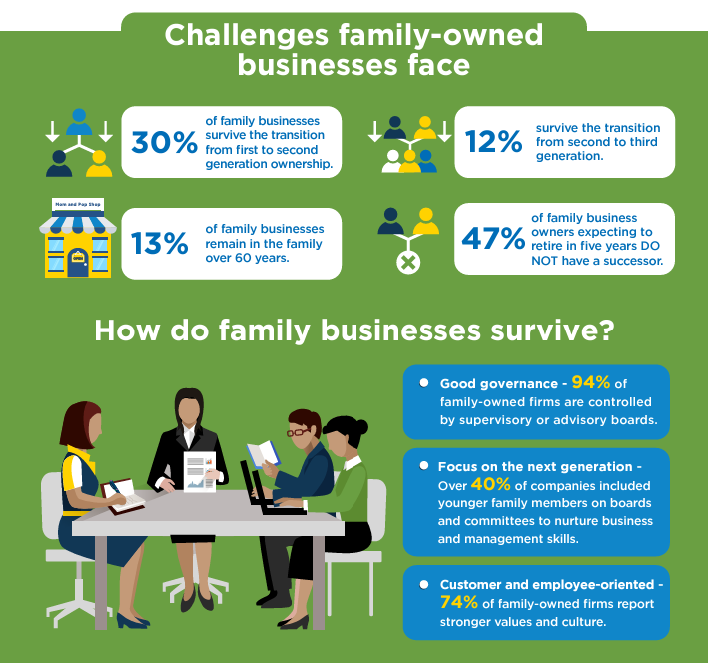Family owned or closely held businesses that survive into the next generation have one thing in common: good governance. Transitioning from first generation to second- or third-generation businesses is highly unlikely without succession planning and the involvement of younger family members and leaders.
According to SCORE, almost 30 million businesses in the U.S. are majority owned by family members such as spouses, siblings or parents and children. These businesses employ a high percentage of the workforce and create most new jobs each year. With so much riding on the success of family-owned businesses, it is critical to teach the next generation about financial management.
Provide Hands-On Experience
Family successors are often involved in the business at an early age. They will start out with simple tasks and learn how the business supports the family. Whether opening mail, running errands or answering phones, these tasks give younger family members a sense of ownership. Paying family members can also support tax mitigation.
As family members get older, they can be involved in planning meetings, visits with customers and skills training in business operations and finance. Along the way, have discussions about their interest in taking over the business someday. Help them imagine it.
Encourage Higher Education
For any family members raised in the business or not, encourage their pursuit of finance and business education outside the business. Trends and economic conditions change. Education in fundamental business practices help family-owned businesses weather these changes better than others, according to Harvard Business Review (HBR).
Think in terms of generations rather than quarterly profits. This is a mindset that helps family business owners invest in the next generation and mentor them, according to HBR. Whether that means pursuit of an MBA, accounting degree, marketing or IT certifications, the next generation needs skills beyond the business culture. This will help them innovate and adapt for the future.
Financial literacy should begin early with paid positions in the business and discussions about budgets, saving and investing. The second generation owner needs to understand the value of prudent financial decisions while enjoying the lifestyle that the previous generation has built. This is important for the business as well as their own wealth management and estate planning.
Include Family Members in Decisions
One of the challenges in family-owned businesses is personal or emotional conflict. To manage these conflicts, communication and collaboration are essential tools. Include family members in the discussion of big and small issues for the business. Ask for their input and encourage new ideas. These discussions will foster a shared vision that leads to an easier succession and business transition.
Some of these conflicts can include compensation and/or wealth transfer to family members outside the business. A family member working in the business has a different point of view about sharing profits or inheritance. Have these discussions early and frequently. Include your CPA and legal advisors to propose options that maintain family harmony and smart financial management.
Evaluate Progress and Adjust Mentoring
One of the concerns in family businesses is whether the next generation is “ready” to lead the business. The owner wants to step back, retire or focus on other aspects of the business transition. Letting go of control requires trust in the business structure and advisory team as well as trust in the family member(s) in line for succession.
Provide constructive feedback that encourages skill building for any hard or soft skills. As succession moves closer, discuss “what if” scenarios and solutions with your advisors and family members. Test these scenarios for short time periods and adjust training or mentoring as necessary. Recognize that the business transition will require adjustments by everyone, including non-family member executives, employees and customers.
For more information on family business financial management and closely held business advisory services, talk to us at LvHJ.










